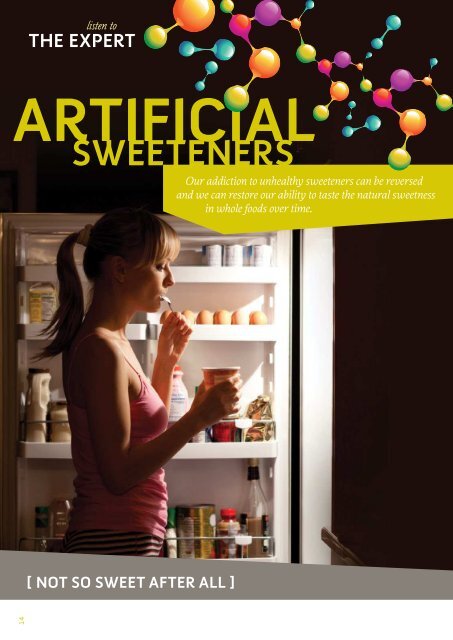You also want an ePaper? Increase the reach of your titles
YUMPU automatically turns print PDFs into web optimized ePapers that Google loves.
14<br />
listen to<br />
THE EXPERT<br />
ARTIFICIAL<br />
SWEETENERS<br />
Our addiction to unhealthy sweeteners can be reversed<br />
and we can restore our ability to taste the natural sweetness<br />
in whole foods over time.<br />
[ NOT SO SWEET AFTER ALL ]<br />
Artificial sweeteners are the latest buzz in the ever-changing world of sugar free,<br />
low fat and diet products that fill shelves of grocery stores, and sadly our refrigerators<br />
and pantries. They are proudly displayed on packages of numerous baked<br />
products, fruit juices, snacks, flavored waters, and much, much more. The clever<br />
marketers of the food industry continue to convince us that some of the harmful<br />
sweeteners are all natural and derived from sugar, and while some of that is true<br />
much of it is misleading. An age old proverb states that “a half truth is a whole lie.”<br />
Sugar substitutes were first developed in the<br />
1950’s when a clinic director worked to develop a<br />
sugar-free diet for patients suffering from diabetes and<br />
other chronic conditions. The industry took off and<br />
today diet sodas and sugar substitutes make up a huge<br />
part of the market and our diet. Processed foods and<br />
artificial sweeteners consumed by Americans have<br />
created a countrywide epidemic of sweet addicts—<br />
and likely you are one of them.<br />
Most of us don’t understand that when we eat refined<br />
sugar or artificial sweeteners our brains believe that<br />
we’re getting nutrients that we need. Instead we<br />
are confusing our body and appetite and our food<br />
cravings are re-triggered. At that point our bodies are<br />
not necessarily looking for more sweetness, they are<br />
looking for nutrients that can only be found in ‘real<br />
food’! Your body tends to crave sugary foods when<br />
it is lacking proper fuel. Sugar is a quick fix and can<br />
give your body an instant boost when it’s running low.<br />
However, using artificial sweeteners will not trick<br />
your body into thinking that it has had its fill; rather,<br />
it wants more sweets because it didn’t get the energy<br />
boost that normally goes along with the sweet taste of<br />
natural foods.<br />
When we take in these low-nutrient foods and drinks,<br />
we have less room for the good stuff. Interestingly<br />
enough, Purdue University scientists have found in a<br />
study using rats that artificial sweeteners increased<br />
caloric intake, body weight and body fat percentage.<br />
If that study didn’t make the artificial sweeteners less<br />
sweet… a study at the University of Texas has shown<br />
that diet soda drinkers have proven to be heavier than<br />
non-diet soda drinkers. That’s right, diet soda and<br />
sweetened water beverages have both been linked to<br />
weight gain and worse yet, kidney damage.<br />
The list of food products containing artificial sweeteners<br />
and sales of such items continues to grow, even<br />
though we now know that these manufactured goods<br />
can cause serious health problems, particularly with<br />
long term use. In fact, according to Sucralose Toxicity<br />
Information Center, there are more side effects from<br />
sucralose (aka Splenda) being reported daily. They<br />
include migraines, diarrhea, swelling, muscle aches,<br />
agitation, numbness, dizziness, stomach and intestinal<br />
cramps among many others. Any of those sound<br />
familiar? You might want to check your labels and<br />
immediately eliminate consumption of the not so<br />
sweet common and dangerous food additives. Stay<br />
clear of acesulfame K, artificial flavoring, aspartame<br />
(Equal, Nutrasweet), Benzene, food coloring, saccharin<br />
(sweet n’ low), and sucralose (Splenda). Remember<br />
what to skip while making your coffee and grocery<br />
list—NutraSweet, Equal, Splenda, and Sweet and Low!<br />
Wondering how to avoid the calories while still<br />
satisfying your sweet cravings? Are you concerned<br />
about consuming too much sugar? Try my personal<br />
favorite, Stevia, a sweet herb that has been used for<br />
more than 400 years across the world, particularly in<br />
South America, and is about 300 times sweeter than<br />
sugar. You can now purchase it at most health food<br />
stores and on the internet (check out iHerb.com for<br />
great deals!).<br />
Good news doesn’t stop here. Our addiction to<br />
unhealthy sweeteners can be reversed and we can<br />
restore our ability to taste the natural sweetness in<br />
whole foods over time. It might seem difficult at<br />
first, but long term benefits are well worth it. Just<br />
remember that chemicals are foreign to our bodies<br />
and consuming them will yield your health goals.<br />
Replace artificial sweeteners with stevia, organic<br />
maple syrup, xylitol, agave nectar, or raw honey. Make<br />
sure these items are of a high quality brand and have<br />
not been overly processed. Once your body has the<br />
fuel that it needs to keep going, it doesn’t need<br />
to ‘remind you’, in the form of sugar cravings,<br />
that it needs an energy boost. I can promise<br />
you that when you consume a variety of all<br />
natural, fresh, raw, “real” foods that are<br />
organic, you won’t have to worry about<br />
scary side effects from a chemically<br />
altered derivative of the real thing.<br />
By Diana Mikolajewska,<br />
<strong>Health</strong>y<br />
<strong>Life</strong>style Coach &<br />
student of Integrative<br />
Nutrition<br />
spring 2012 BETTERLIFE | 15












